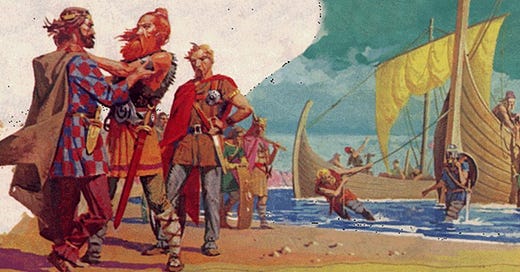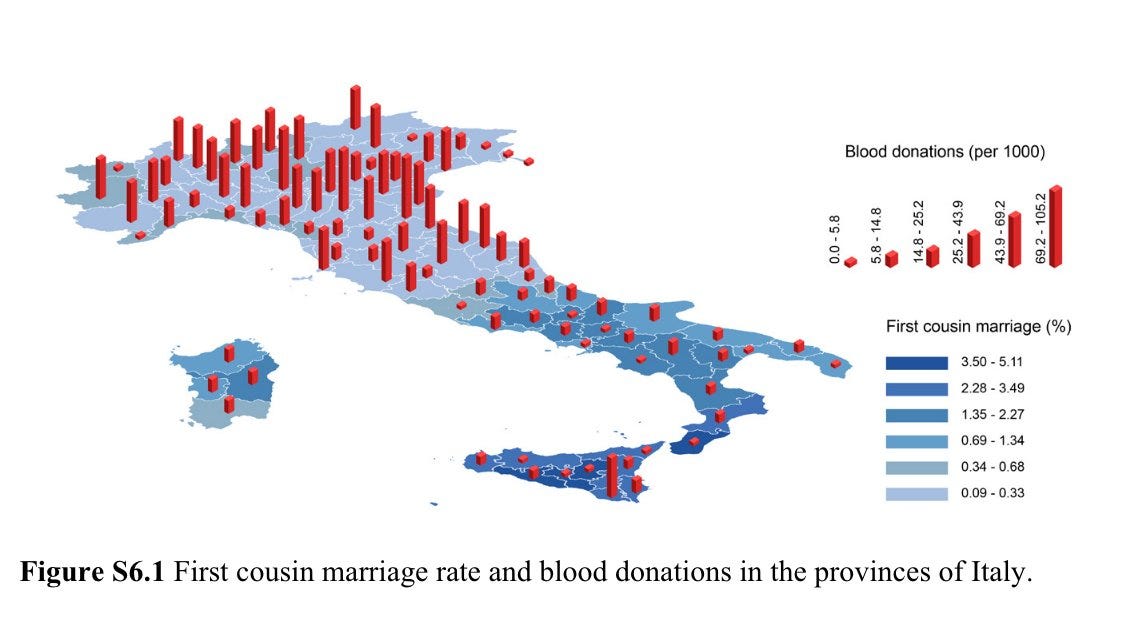One idea that is popular in our circles is that we must retribalise. The idea is that Whites are the least tribal of peoples in the modern world and due to the influx in our societies of foreigners who hold onto their tribal identities we are forever loosing out. I think it is worth pointing out that this is very similar to an argument made about racial identity but there are differences. In this broader racial theory Whites are the losers in their now multicultural societies because non-whites form a more cohesive anti-white coalition that thwarts Whites AND Whites themselves refuse to act in their own racial interests which compounds the effect. We see examples of this where white liberals align with diverse anti-whites to help elect non-white politicians all the time. It is not clear to me that the tribal perspective is in direct conflict with this broader racial perspective but it is different. In the tribal world we step down a level and see conflicts brewing between the multitude of browns in our society. The UK is a great example of this where we see brown on brown conflict between Pakistanis and Indians or we could look at Canada where the tribalism shakes out into religious conflict between Sikhs and Hindus.
This is a bit of a long winded way of saying that some people use the term ‘tribal’ as a substitute for race. Maybe they think it sounds better for optics reasons or just rhetoric reasons but that exists. When those people talk about Whites retribalising then they mean as a racial group centered around a broad European heritage. However there are others who use the term more precisely. They would use the term to refer to a tribalising amongst Whites as much as anything. A reverting of behavior towards tribal norms. Again this isn’t to say that proponents of this don’t also believe in a wider racial grouping of White and that it has value but they do see an importance in a set of identities that is not as broad as simply White. To be clear in this instance we are mainly talking about people who are using the term tribal correctly and not just substituting it for racial solidarity at the highest level amongst European peoples.
One of the principle questions asked about Europeans and debated is why we have for a long time behaved in a less tribal way compared to other peoples. It is this very article that has prompted another round of debate. Even within Europe though there are differences as I discussed in my other essay about the importance of the Hajnal line and Patrilocal family units. There are a number of theories floated as to why Europeans are less tribal and key amongst them is the notion around the forbidding of first cousin marriage. There is debate about how and when this started, some have noted that Germanics seem to have an earlier aversion to it whilst others seem to contend it was the decrees of the Church that helped eliminate it from most of Europe. The underlying assumption is that cousin marriage is a critical component of truly tribal societies. A friend of mine and I were discussing this and he made this comment that sums it up:
Being doing a lot of reading on Arab history recently. Cousin marriage is what underpins the entire system. Cousin marriage and polygamy. Everyone inside these clans are more than just third cousins. They are all closely related though intricate webs of in-laws, shared uncles and aunts, everyone being some degree of first cousin.
The family tree of Muhammad and his companions drawn from his clan the Banu Hashim stands as testament to what I am talking about.
This is why tribal feeling is so strong. Your third cousin isn’t just your third cousin, he is also married to your sister and you probably share an aunt through marriage as well.
He and many others are clearly onto something with the attitudes that seem to come from the relationship to cousin marriage and tribal behaviors. This fascinating map from this X thread is also seemingly supporting of that argument. Here we see blood donations are highest in regions of Italy with the lowest rates of first cousin marriage. The act of proactively donating blood to strangers doesn’t make sense to a tribal mindset, you would only donate based on immediate need of a fellow tribal member.
The aforementioned article however ultimately comes to an interesting closing:
Regardless of how we define avoidance of cousin marriage, it seems to be an imperfect yardstick for measuring the evolution of the entire mental and behavioral package of northwest Europeans—not only individualism but also high levels of affective empathy and guilt proneness, which led to the creation of a unique moral system. Some of these adaptations may have originated only in northwest Europe, while others may have arisen earlier within a broad North Eurasian zone.
The thread author of our map of Italy came from disagrees with the conclusion presented. It’s all pretty interesting stuff about where you want to come down on the matter. The paper here has the following findings.
Our theory predicts that populations with (i) a longer historical exposure to the medieval Western Church or less intensive kin-based institutions will be more individualistic, less conforming, and more impersonally prosocial today; and (ii) longer historical exposure to the Western Church will be associated with less-intensive kin-based institutions.
RESULTS
We test these predictions at three levels. Globally, we show that countries with longer historical exposure to the medieval Western Church or less intensive kinship (e.g., lower rates of cousin marriage) are more individualistic and independent, less conforming and obedient, and more inclined toward trust and cooperation with strangers (see figure). Focusing on Europe, where we compare regions within countries, we show that longer exposure to the Western Church is associated with less intensive kinship, greater individualism, less conformity, and more fairness and trust toward strangers. Finally, comparing only the adult children of immigrants in European countries, we show that those whose parents come from countries or ethnic groups that historically experienced more centuries under the Western Church or had less intensive kinship tend to be more individualistic, less conforming, and more inclined toward fairness and trust with strangers.
CONCLUSION
This research suggests that contemporary psychological patterns, ranging from individualism and trust to conformity and analytical thinking, have been influenced by deep cultural evolutionary processes, including the Church’s peculiar incest taboos, family policies, and enduring kin-based institutions.
To briefly summarize then:
The Aporia essay concludes that the role of Christianity was not as critical in reducing cousin marriage BUT also that this person thinks this in itself is not a good starting point in understanding why Europeans are more individualist.
The other paper argues that Christianity and the Church’s depth of influence and exposure is the greatest source of weakening kinship ties. Due to it changing the structure of the family life, reducing tribalism it has led us into the society that we have today.
So where does that leave this discussion?
To me all of this comes down to an interesting question:
What is the role of first cousin marriage in tribalism?
As I see it you can land in one of the following main camps:
Cousin marriage was a taboo amongst Germanic/Northern Europeans BEFORE Christianity made it more widespread across Europe. This existing taboo helped weaken kinship ties and detribalize over time.
Cousin marriage was largely outlawed by the Church as it rose to power in society. The laws helped detribalize over time and weaken kinship ties.
Cousin marriage was an existing taboo amongst Germanic/Northern Europeans BUT that does not mean they were less tribal. There are other factors.
Cousin marriage was outlawed by the Church BUT this alone doesn’t account for all the individualism.
Personally I think arguments 1 and 2 are more compelling than 3 and 4. To me at least it seems that societies in which tribal relations hold strong and held strong there are higher rates of intermarriage not just of first cousins but others as well. However I don’t think that is the full story of tribalism. Clearly there has existed a kind of middle ground. Perhaps this is cope or perhaps there is in fact a kind of third way to think about tribalism for Europeans over this time.
We use the term tribal to describe loyalty to a place as much as a people in the West. Often exemplified in sporting rivalries of today. If you step away from the modern poz of the Premier League and use UK Football as an example there was a crude form of tribalism that arose between teams. Local derbies became passionate affairs and largely were geographically based. These people might not have been marrying their first cousins but they knew who they were. This kind of tribal identity isn’t just in sport. We see it in other countries. Swiss Kantons. A tiny country but divided into places and people fiercely loyal to those places. The accents change valley to valley. You are known as an outsider by traveling between them. Of course they are all Swiss but they have unique customs and traditions to their place.
That I think is the difference with European tribalism. It’s become rooted in places not kin. Do you think the tribal Pakistani’s in the UK even care that much about the notion of Pakistan? They are bound by their tribal blood first and foremost. We Europeans are different. We are bound by blood AND soil. People have a loyalty to places and have deep roots in them. They may not marry cousins but this kind of tribalism was once commonplace. We knew who we were and where we were from. As much as we were our fathers son we were all stewards of a place and land. This tribalism was more robust and powerful, it brought separate families together in places. Much of the plot of The WarWolf is about the inhabitants of a place uniting and standing for themselves. It is NOT about the growth of a single interrelated tribe or clan. To most of us I think this might be more what we mean when we think of tribalism in the West at any rate. The truth is, if you read history you see infighting between Europeans for hundreds of years. A book I read about the early European traders who arrived in Japan was at pains to discuss how the dynamics of the conflict between Portugal and England colored events, the Dutch then turn up and are in conflict with the English before uniting as Protestants against the Catholic Portugese. Tribal behaviors of the past that are forgotten.
If you do believe in true retribalization I wonder what that means to you. I would guess it doesn’t involve first cousin marriage. There are clearly some benefits to that kind of tribalism though. That kind of loyalty. I don’t think it’s been part of the European story for a long time, certainly not the part of Europe I’m from and I certainly don’t see a return to it. So it is a good time to think carefully what European tribalism looks like and means.
I’ll have a short follow up to this article to discuss some further differences regarding European tribalism.





